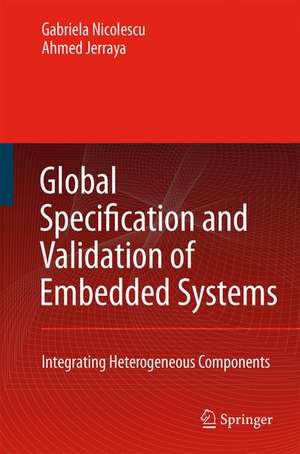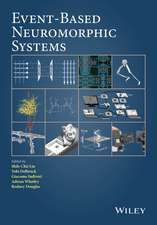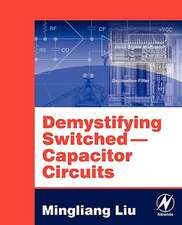Global Specification and Validation of Embedded Systems: Integrating Heterogeneous Components
Autor G. Nicolescu, Ahmed A. Jerrayaen Limba Engleză Hardback – 19 iun 2007
| Toate formatele și edițiile | Preț | Express |
|---|---|---|
| Paperback (1) | 633.84 lei 43-57 zile | |
| SPRINGER NETHERLANDS – 19 oct 2010 | 633.84 lei 43-57 zile | |
| Hardback (1) | 640.06 lei 43-57 zile | |
| SPRINGER NETHERLANDS – 19 iun 2007 | 640.06 lei 43-57 zile |
Preț: 640.06 lei
Preț vechi: 753.01 lei
-15% Nou
Puncte Express: 960
Preț estimativ în valută:
122.48€ • 128.20$ • 101.94£
122.48€ • 128.20$ • 101.94£
Carte tipărită la comandă
Livrare economică 31 martie-14 aprilie
Preluare comenzi: 021 569.72.76
Specificații
ISBN-13: 9781402061516
ISBN-10: 140206151X
Pagini: 175
Ilustrații: XII, 148 p.
Dimensiuni: 155 x 235 x 22 mm
Greutate: 0.41 kg
Ediția:2007
Editura: SPRINGER NETHERLANDS
Colecția Springer
Locul publicării:Dordrecht, Netherlands
ISBN-10: 140206151X
Pagini: 175
Ilustrații: XII, 148 p.
Dimensiuni: 155 x 235 x 22 mm
Greutate: 0.41 kg
Ediția:2007
Editura: SPRINGER NETHERLANDS
Colecția Springer
Locul publicării:Dordrecht, Netherlands
Public țintă
ResearchCuprins
Heterogeneous Systems Modeling: Basic Concepts.- Execution Models.- Heterogeneous Systems Validation Based on Execution Models.- Anatomy of a Hardware/Software Execution Model in Heterogeneous Systems.- Anatomy of a Continuous/Discrete System Execution Model for Timed Execution of Heterogeneous Systems.- Methodology for Heterogeneous Systems Validation.
Notă biografică
Ahmed Amine Jerraya is Research Director with CNRS and is currently managing research dealing with Multiprocessor System-on-Chips at TIMA Laboratory, France. He received a degree in engineering from the University of Tunis in 1980 and the D.E.A., "Docteur Ingénieur", and the "Docteur d'Etat" degrees from the University of Grenoble in 1981, 1983, and 1989 respectively, all in computer sciences. From April 1990 to March 1991, he was a Member of the Scientific Staff at Nortel in Canada, working on linking system design tools and hardware design environments. He served as General Chair for the Conference DATE in 2001 and published more than 200 papers in International Conferences and Journals. He received the Best Paper Award at the 1994 ED&TC for his work on Hardware/Software Co-simulation.
Gabriela Nicolescu is currently professor at Ecole Polytechnique Montreal teaching embed systems design and real-time systems. She received a degree in engineering and Ms.S. from Polytechnic University of Romania in 1998 and "Docteur Ingénieur" degree from the University of Grenoble, France in 2002. Her research work is in the field of specification and validation of heterogeneous systems and multi-processor system-on-chip design. She published more then 40 papers in International Conference and Journals
Gabriela Nicolescu is currently professor at Ecole Polytechnique Montreal teaching embed systems design and real-time systems. She received a degree in engineering and Ms.S. from Polytechnic University of Romania in 1998 and "Docteur Ingénieur" degree from the University of Grenoble, France in 2002. Her research work is in the field of specification and validation of heterogeneous systems and multi-processor system-on-chip design. She published more then 40 papers in International Conference and Journals
Textul de pe ultima copertă
Global modelling and validation is required to master the design of systems made of heterogeneous components. These systems are now omnipresent in our life, and they may be found in several domains such as communications (ex. mobile terminals, optical switches), health (e.g. cardiac stimulators, cochlear implants), transportation (ex. automotive and aeronautical), etc. The main difficulties for their design are modelling and validation of the interactions between different components (hardware, software, analogue, RF, optical and micro-mechanical).
Global Specification and Validation of Embedded Systems offers a deep understanding of concepts and practices behind the composition of heterogeneous components. After the analysis of existing computation and execution models used for the specification and validation of different sub-systems, the book introduces a systematic approach to build an execution model for systems composed of heterogeneous components. Mixed continuous/discrete and hardware/software systems will be used to illustrate these concepts. The benefit of reading this book is to give a clear vision on the theory and practice of specification and validation of complex modern systems. The examples give to the designers solutions applicable in their daily practice.
Global Specification and Validation of Embedded Systems offers a deep understanding of concepts and practices behind the composition of heterogeneous components. After the analysis of existing computation and execution models used for the specification and validation of different sub-systems, the book introduces a systematic approach to build an execution model for systems composed of heterogeneous components. Mixed continuous/discrete and hardware/software systems will be used to illustrate these concepts. The benefit of reading this book is to give a clear vision on the theory and practice of specification and validation of complex modern systems. The examples give to the designers solutions applicable in their daily practice.
Caracteristici
Offers a deep understanding of concepts and practices behind the composition of heterogeneous components Introduces a systematic approach to build an execution model for systems composed of heterogeneous components Mixed continuous/discrete and hardware/software systems will be used to illustrate these concepts. Gives a clear vision on the theory and practice of specification and validation of complex modern systems Examples give the designers solutions applicable in their daily practice












